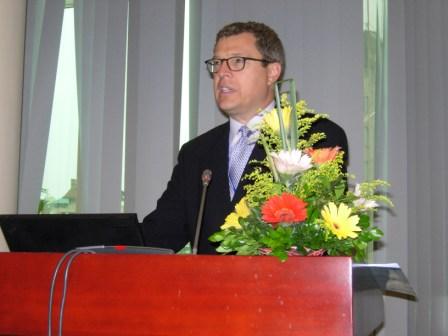Religion and Rule of Law Conference in Vietnam, 16-18 June 2011

On June 16-18, 2011, Center Director Professor Cole Durham and Associate Director Professor Brett Scharffs participated in a conference on Religion and the Rule of Law in Southeast Asia in Hanoi, Vietnam. The conference was the third in a series of conferences held in Vietnam under the co-sponsorship of the Institute of Religious Studies of the Vietnamese Academy of Social Sciences (VASS), the Vietnam-U.S.A. Society, the Institute for Global Engagement, and BYU Law School’s International Center for Law and Religion Studies.
Scholars and government officials from Vietnam were joined at the conference by scholars and lawyers from Brunei, Canada, the People’s Republic of China, France, Hong Kong, Indonesia, Laos, the Philippines, Singapore and the United States for a wide ranging discussion of contemporary issues that arise in the relationship between religion and the state, and recent developments in Vietnam, Laos, and other countries in Southeast Asia in the area of law and religion.
Professor Durham spoke on “Typical Features of Effective Laws on Religion: A Comparative Perspective.” He described the findings of his work as General Rapporteur for the topic “Religion and the Secular State” at last year’s International Congress of Comparative Law, held in Washington, D.C. For that project, forty-five national reports were prepared on the ways in which the secular state deals with religion and belief. He noted two broad patterns. In some countries where secularism is treated as an ideology or system of belief, attitudes towards religion are often quite “strict” or “rigid.” In countries that adopt a second, more flexible approach, a more open and accommodating attitude is evident in protecting freedom of religion and conscience. This approach favors substantive over formal conceptions of equality and neutrality, and takes more seriously claims of conscience as grounds for accommodating religiously-motivated difference. These two different approaches are reflected in systems of governance in a variety of ways, including whether registration systems are used to facilitate or frustrate religious activities, and in the degree of autonomy that is afforded to religious groups.
Professor Scharffs spoke on the topic, “The U.N. Declaration of Human Rights: International Standards of Religious Freedom and the Rule of Law.” He described the history of the drafting of the UDHR, as well as the key provisions relating to religious freedom. He also discussed general patterns that have emerged over the past twenty years in jurisprudence based upon human rights standards for protecting freedom of religion and belief, including the European Court of Human Rights, United Nations human rights monitoring institutions, and national constitutional courts in countries where there are constitutional provisions based upon international human rights freedom of conscience standards.
He discussed three primary institutional norms and three primary individual freedom norms that have emerged from this interpretive practice. The institutional norms relate to the issues of registration of religious communities, autonomy of religious groups over their own organization and affairs, and equal treatment. The individual religious freedom norms relate to freedom of belief and expression, the right to choose and change one’s beliefs and religious affiliation, and the practice of creating quite a broad range of accommodations for religious beliefs and manifestations.
The conference was the third conference in the past six years in Hanoi on religion and the Rule of Law. The first, “Religion and the Rule of Law in Southeast Asia, An International Academic Conference” was held in Hanoi in September, 2006. The second, “Religion and the Rule of law in Southeast Asia: Continuing the Discussion,” was held in Hanoi in November 2007. Each of these conferences provided an opportunity for international experts to gather with top-level Vietnamese academics, researchers and government officials to discuss issues relating to freedom of religion. This conference is being held at a time when there is considerable uncertainty about whether Vietnam and other countries in Southeast Asia will continue gradually loosening restrictions on religious freedom and in the shadow of some serious crackdowns on religious freedom in recent months.